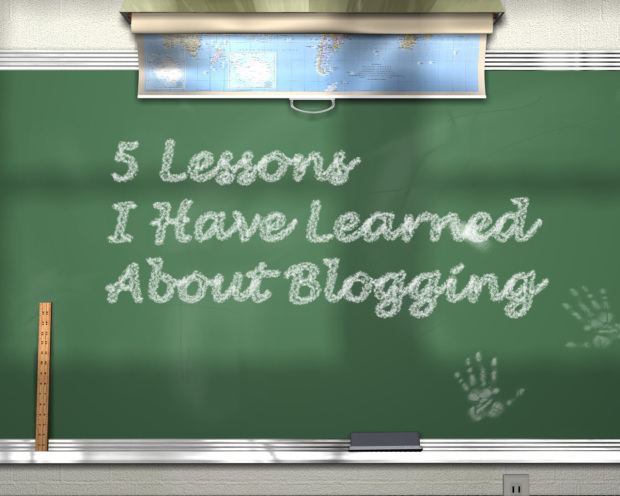When I started blogging in June 2007 I really didn’t know how to manage a blog or even how long I can keep writing blog entries. Like many people, I tend to start something that interests me at the time, but then get bored and move onto something else. With that thinking, I started using Blogger since it required no financial commitment, just time. After a year, I discovered that I did like to manage a blog, so I switched to a self-hosted WordPress blog, and haven’t looked back.
Over the past seven years of managing this blog I have learned many lessons, and have experienced many facets of not only blogging but websites, in general. I have made mistakes, and learned from those mistakes, but have also enjoyed a few successes. I have blogged about both the mistakes I have made and the successes I have achieved, so now I feel I should give an update on the lessons I have learned about blogging.

1. Just Be Yourself – Write What You Want

When I started my blog I was always cautious about publishing a post because I was trying to think about how my readers would interpret the post, and whether they would even read it. I was worried about whether anyone would want to read what I wrote. Back then, of course, I didn’t get many visitors, so I was even more paranoid about losing the ones I did have reading my blog.
It seems I am not alone in that thinking as I have had many people mention the same nervousness when they start creating a website or blog. After some time of writing posts I quickly learned that I should just write the way I want to, and not what I think readers would like me to write.
Readers of my blog, especially those that have subscribed, probably have an understanding on what I write, and how I write. The key is that everyone has a writing style that appeals to someone. I have read some blogs that I have enjoyed how the person has written their posts, but I won’t imitate them because that just isn’t me.
With your blog, you should write in your own way, with your own personality, and not copy someone else. Just be yourself and your readers will enjoy reading your work, and not someone else.
2. What Works Today, May Not Work Tomorrow

The world of blogging is constantly changing, but then again, anything related to technology is constantly changing. When you start blogging, you will find that many of the techniques you use to gain visitors may not work in future years. This is especially true for SEO tactics. Google, the most popular search engine, is constantly changing its ranking algorithm, so keeping up with what works can be quite difficult.
When I started blogging writing articles and publishing those articles in article directories was a popular way of generating backlinks. A few years later Google penalized all the article directories, and all the article links to the different sites became worthless. All that time spent writing articles, that eventually became devalued, for backlinks amounted to a waste of time in the end.
Several years after penalizing article directories, Google then penalized guest posting for the same reason.
The above two examples illustrate how something that once worked in favor of bloggers, eventually stopped working, and may have become a detriment, a few years later.
You will find people advertising services that will talk about increasing visitors or readership. While such products may work over the short-term, the long-term could have a negative impact on your traffic.
It has always been said that the best method of generating traffic is by writing posts people want to read. The next two lessons illustrate this point.
3. Accepting Guest Posts Requires Strictness

I have written about guest posts many times in the past, and have even discussed my guest posting strategy. The decision to accept and publish guest posts on your blog isn’t one should take lightly, and you definitely should have a set of guidelines created before accepting guest posts.
My experiences with guest posts have been mixed. I have had some great posts submitted to my blog, and many posts that made me question my decision to accept guest posts. The good thing is that I have full control on which guest posts I accept and publish. This last point is one that I would like to talk about further.
When accepting guest posts, make sure you have a good set of guest posting guidelines before accepting guest posts. Your guidelines should outline the post standards – both formatting and publishing – you expect from guest posts, and outline what the author can expect in return.
The important aspect about publishing the guidelines is ensuring that you enforce those guidelines when a post is sent to you. I have had many authors agree to the guidelines, but then send me a post that wasn’t even close to meeting the guidelines. I usually reject the guest post and explain my reasoning for the rejection.
Remember, you have set the guidelines to not only make sure the guest posts that you publish are high quality, but also to make sure the integrity of your blog is protected. You will probably lose readers if you start publishing guest posts that are lower quality than posts you would write yourself.
4. “How To” or Tutorial Posts Are Traffic Generators

When I created Technically Easy I envisioned a blog where I can write posts about issues I have solved with regards to technology. This blog was a place where I can publish step-by-step instructions on how I solved a problem.
Over time I began to realize that many of those “how to” posts started being linked from various forums and other sites, which eventually caused the posts to rank well in the search engines. It became clear to me that “how to” or tutorial posts can be a great way of generating traffic to my blog.
The idea is actually really simple. Most people use search engines to find an answer to a question or problem they are having. By writing a post that provides an answer to such a problem, a visitor will visit the page that provides the answer. The interaction between the visitor and the post may not stop once the visitor solves their problem.
The visitor may then visit a forum where another person has the same problem. The visitor may then remember they found the solution to the same problem on your blog, and then offer a link to your blog post in the forum post. Without even trying, you get an organic backlink to your blog, and enough of those links will help that post rank well in search engines.
While I write various types of posts – tutorials (how to), opinion, reviews – on my blog, the tutorial posts always are the most visited posts on my blog. Technology does change, however, so some of my tutorial posts do lose traffic as they become irrelevant, but during a period of a few years, those posts have consistently ranked well and generated good traffic.
5. Have Fun

Blogging can seem like a chore at times, especially when you have set yourself a deadline and are not close to meeting it. Other times you may just get tired of having to write posts that blogging just feels like more trouble than it is worth. I have felt like that on many occasions.
One thing I did learn, however, is that to enjoy blogging, you really have to learn to have fun. Once blogging starts to feel like a job, perhaps it is time to re-evaluate the purpose of your blog, and what you are looking to get out of blogging.
The primary goal of my blog was to share my experiences, and offer technology-related advice. As I started to experiment with different aspects of blogging, I felt that the primary goal was not being achieved as I tried to achieve different goals, such as traffic and earnings targets. The problem was that my primary goal was what attracted visitors, and my blog’s traffic and income suffered.
Once traffic started to decrease, and income in relation, blogging stopped being fun for me, and became more of a chore as I tried to experiment even more with correcting the issue.
I have since changed my tune again, and have started to refocus my blog to its original goal of helping others with technology. To some degree I feel like I am starting over with my blog, but it has become fun again.
